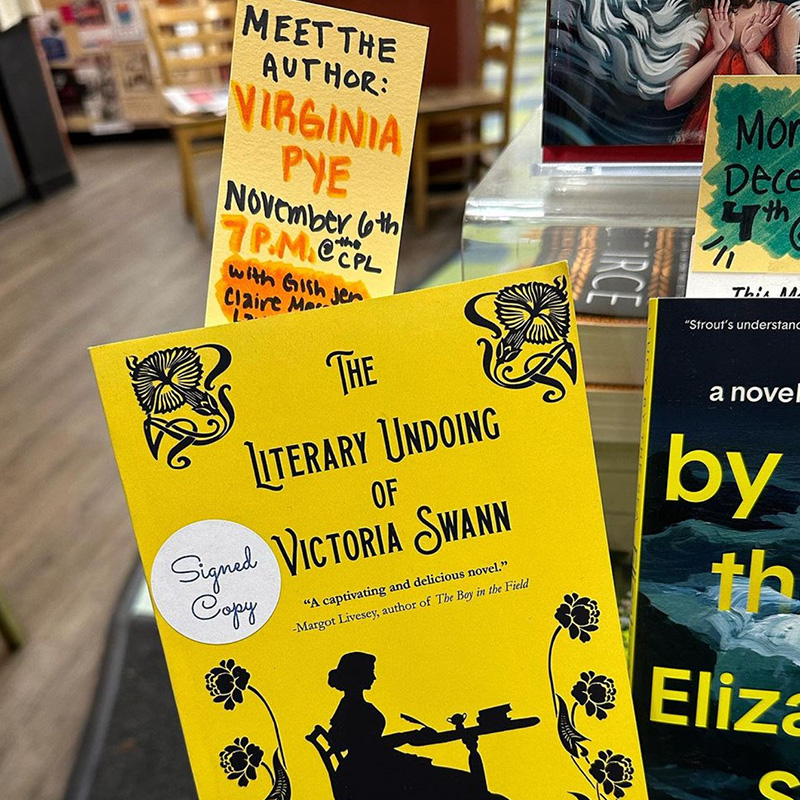
Virginia Pye’s “The Literary Undoing of Victoria Swann” on display Oct. 29 at Porter Square Books in Cambridge with a note about Pye’s Monday event. (Photo: Virginia Pye via Instagram)
Historical Cambridge is known for its literary figures: Lowell, Longfellow, Cummings, Margaret Fuller, W.E.B. Du Bois – writers who are, apart from Fuller, male.
Author Virginia Pye aims to change that musty history with her October book “The Literary Undoing of Victoria Swann” and a Monday event at and in collaboration with the Cambridge Public Library, as well as with partners Porter Square Books and History Cambridge.

Authors Gish Jen, Claire Messud and Laura Zigman will join Pye to discuss their writing and how the city inspires it.
“Particularly in Cambridge, I just kept encountering these wonderful women writers who have been writing, sometimes for decades, and publishing books,” Pye said. Her new book is “almost a tribute to them,” she said, “and to the women writers of Cambridge’s past as well.”
The first American-born professional author was a woman named Hannah Adams, who lived much of her life in Cambridge. Dudley Bradstreet was America’s first published poet, and she lived in Cambridge. Margaret Ray, a Cantabrigian, wrote “Curious George.” Pauline Elizabeth Hopkins, an African American, was a playwright and publisher of note. Famous writer May Sarton went to the Shady Hill School, and the poet Elizabeth Bishop lived in Cambridge for many years.
“Victoria Swann” uncovers some of these lost histories. In it, Swann is a writer of dime novels – little books for the working class popular between 1860 and 1915 that were largely romances written and read by women. Though the novels were often silly and relied on a male savior and helpless woman, they could reveal real hardships faced by the female readers, as Pye discovered in at Brandeis University archives, reading dime novels serialized in magazines and the advice columns they were packaged with.
“These are letters written by real readers to the author, basically asking ‘Dear Abby, help me,’” Pye said. “It’s one story after another of them being taken advantage of. A boss asks a young woman to stay late after work, praises her for her job and then corners her in the office when they’re alone. A boyfriend promises to marry a young woman, and then gives her wine but never proposes.” On other pages are ads, many of them veiled advertisements for abortion methods.
Discovering these stories of female pain that weren’t taught, Pye decided to write a story about a Cambridge dime novelist who sets out to write what it’s really like to be a woman rather than the usual fantasies.
Pye also works in the present day to create a difference, hoping to push modern female struggles into the open. Through her event, she will speak with other female authors – including the esteemed Jen (“Thank You, Mr. Nixon”), Messud (“The Emperor’s Children”) and Zigman (“Small World”) – and ask about their experiences in Cambridge. She wants to know if a male-dominated writing literary history has been intimidating, and whether they feel that their voices count as much. She wants to know what it’s been like for them to have female support when publishing gets rough. She wants Cantabrigians to hear their stories. And most of all, she wants to see more Cambridge women writers in person, so they can see how their numbers have grown.
“Cambridge as Inspiration: Women Authors Past and Present” runs from 7 to 8:30 p.m. at the Cambridge Main Library, 449 Broadway, Mid-Cambridge. It’s free and in-person; registration is required.
